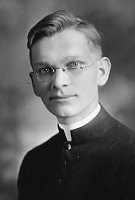
Father William A. Kaschmitter, MM
Born: June 11, 1899
Ordained: June 15, 1924
Died: August 6, 1986
On the Feast of the Transfiguration of Our Lord, August 6, 1986, Fr. William Andrew Kaschmitter was given the privilege to share in the same vision as Peter, James and John experienced on that day.
Fr. Kaschmitter was born on June 11, 1899 in Rock Valley, Iowa.
It was on March 13, 1918 that he first wrote to inquire about his possible entry into the Society. He was accepted in July as a student at Maryknoll. He had previously studied at Conception College in Missouri from 1913 to 1918. Explaining his desire to enter, he wrote: “As for the origin of this desire for missionary work, I could scarcely give any adequate explanation. Touched by the accounts of the heroic servants of the lepers, I felt inclined in that direction. The idea would come and go at intervals. I started at Conception College in 1913 but did not know which life to choose in the priesthood. Finally the firmer resolution tended to the missionary field – to the lepers preferably, but still whithersoever I might be sent.”
His untiring zeal for mission began even during his seminary years. While on vacation he did his utmost to promote the missions, asking for church dates in the various parishes he visited. He was ordained on June 15, 1924 and assigned to teach Moral Theology and Church History at Maryknoll, N.Y., as well as being Spiritual Director to the Brothers. In 1932, when Father William got his first taste of overseas mission when assigned to work in the Los Angeles Japanese Mission (among the Japanese-speaking people) and after a short time to Fushun, Manchuria in 1933. He spent four years as a teacher at the minor seminary in Fushun and then in 1937 went to work in Peking as a member of the Synodal Commission in charge of the Lumen News Service. Father used his journalistic ability to write profusely about life in China, the Church and the people.
During the war years he was interned in Peking and returned to the States only in 1946. Even during this time he was able to get letters and some writings to the outside world.
In 1946 he was assigned to work in Japan and was there but a short time when the Japanese Bishops asked him to head the Information Department of the National Catholic Committee and he published a news journal called Tosei News. Since he was a man known to get things done, the bishops also asked him to set up and direct a Secretariat for Migration.
This was an attempt on the part of the Church to help find other countries where Japanese people could settle and alleviate the problem of overpopulation on the small island.
In 1956 he was elected as a delegate to the 4th General Chapter. Shortly after this he began to look for some organization that would establish a research center for the study of justice between nations. He embarked on an extensive tour of the U.S. and Canada to lecture on what he called international social justice. He helped found the Research Center for International Justice at Louvain, Belgium, and became its Administrator in 1959. “To give our neighbor in charity what is due to him in justice is sordid mockery,” he said often during his lectures. He proposed “not a set of pious resolutions in favor of peace but an organized body of principles for determining rights and obligations in the international order.”
In a brief biographical sketch it is difficult to single out any one achievement of this great missioner. He had many talents and used them for furthering the mission cause. He ran into many difficulties over the years but this did not dampen his spirit to fight for what he believed was right. He once wrote: “I do not pray so much that Maryknoll, its head and members, should be free from difficulties, but rather that they will not only overcome difficulties but that these should serve as stepping-stones to greater perfection in the way of wisdom and age and grace with God and men.”
Fr. Rafael Davila presided at the Vigil Service on August 7th, with Bro. Adrian Mazuchowski reading the biography and Bro. Thomas Hickey the Scriptural reading. The funeral Mass was celebrated the next day with Fr. John Corcoran as principal concelebrant and Fr. Robert Sheridan giving the Homily. Fr. Thomas McDermott gave the graveside ceremony.
